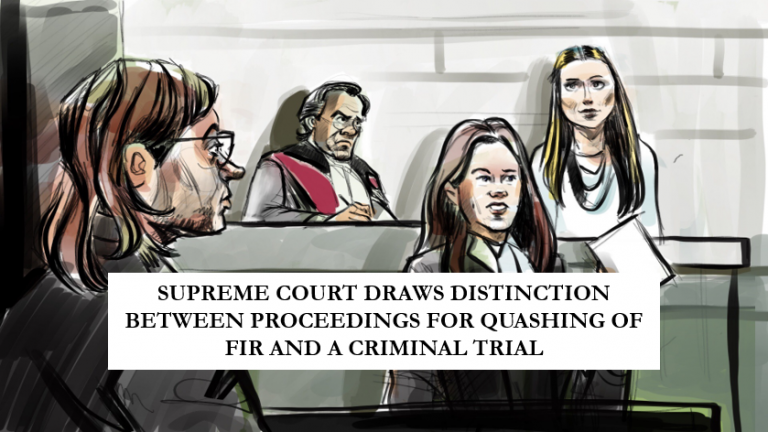SUPREME COURT DRAWS DISTINCTION BETWEEN PROCEEDINGS FOR QUASHING OF FIR AND A CRIMINAL TRIAL
A Two Judge Bench of the Supreme Court has in a matter of Mahendra KC vs State of Karnataka and Others passed a Judgment dated 29-10-2021 and drawn a distinction between proceedings initiated for quashing of First Information Report (FIR) under Section 482 Code of Criminal Procedure 1973 (CrPC) and a criminal trial.
In this case, a Complaint was filed on 06-12-2016 in Maddur Police Station, Karnataka by one, Mr. Mahendra KC (Appellant herein) against the Respondent, a Special Land Acquisition Officer, for offence punishable under Section 306 of the Indian Penal Code 1860 (IPC) (Abetment of suicide) read with Section 34 IPC (Acts done by several persons in furtherance of common intention) committed in respect of the Appellant’s brother (Deceased). The said Complaint was later registered as FIR bearing No. 565 of 2016 on 07-12-2016. The relevant provisions of the offences are reproduced below for easy reference:
Section 34 IPC: Acts done by several persons in furtherance of common intention.—When a criminal act is done by several persons in furtherance of the common intention of all, each of such persons is liable for that act in the same manner as if it were done by him alone
Section 306 IPC: Abetment of suicide—If any person commits suicide, whoever abets the commission of such suicide, shall be punished with imprisonment of either description for a term which may extend to ten years, and shall also be liable to fine.
The Complaint stated that the Deceased was working as a driver for the Respondent-Accused. The Deceased had discussed with the Appellant and his friends in December 2016 that the Respondent-Accused has accumulated disproportionate assets of over Rs. 100 Crores and that the Respondent-Accused had utilized the mobile and bank account of the Deceased to transfer funds to the Accused’s relatives for converting “black money into white”. The Complaint further stated that the Deceased had knowledge about the dealings of the Accused, hence the Respondent-Accused along with another driver, had been harassing him and threatening to murder him. As a result of the mental stress, the Deceased committed suicide by consuming poison in a Lodge Room on 06-12-2016. A suicide note was also found in the Lodge Room (Suicide Note). The Suicide Note specifically named the Respondent-Accused and the driver as responsible for his death. Thereafter, the Respondent-Accused was arrested on 11-12-2016.
The Respondent-Accused filed a Petition under Section 482 CrPC before the Karnataka High Court seeking quashing of the FIR No. 565 of 2016.
The High Court vide Judgment dated 29-05-2020 allowed the said Petition and quashed the proceedings initiated pursuant to the Complaint dated 06-12-2016 and the FIR No. 565 of 2016 on various grounds inter alia that (i) the Suicide Note was quite lengthy (21 paragraphs / 12 pages), (ii) the Government could not find any material to corroborate the allegations made by the Appellant in the Section 482 Petition, (iii) there was no incriminating material available against the Respondent-Accused other than a bald statement that he threatened the Deceased, (iv) even if a threat was given, it has to be examined that the nature of threat was of such an alarming proportion so as to drive a ‘normal person’ to contemplate suicide, (v) the Deceased had consumed alcohol, so there is a possibility that under the influence of alcohol, he did not act sanely, etc.
Aggrieved, the Appellant and the State of Karnataka filed two separate Criminal Appeals before the Supreme Court under Article 136 of the Constitution of India, against the High Court Judgment dated 29-05-2020.
The Apex Court set aside the Karnataka High Court Judgment dated 29-05-2020 and made the following observations in this case:
1) That there is a distinction between proceedings initiated for quashing FIR under Section 482 CrPC and a criminal trial:
i) While considering a Section 482 CrPC Petition, the High Court has to determine whether the allegations in a complaint, prima facie establish the ingredients of the alleged offence.
ii) The High Court at this stage, cannot test the veracity of the allegations and proceed in a manner in which a judge, while conducting a criminal trial, would proceed based on the evidence collected during trial.
iii) The High Court has the power under Section 482 CrPC to issue orders that are necessary to prevent the abuse of legal process or otherwise, in order to secure the ends of justice.
iv) The High Court may quash a complaint / FIR, if the allegations made in the FIR do not prima facie constitute any offence against the accused, or if there is no sufficient ground to proceed against the accused, or where there is an express legal bar under any specific law against instituting proceedings, or where criminal proceedings have been maliciously instituted out of personal grudge against the accused, etc.
2) That in this case, the specific allegations made in the Complaint and FIR establish a prima facie case of abetment of suicide under Section 306 IPC.
3) However, the High Court in this case wrongly proceeded to hold a criminal trial by (a) analysing from its own perspective the veracity of the allegations, (b) commenting upon and making strong observations about the Suicide Note, (c) making observations about how the behaviour of the Deceased before he committed suicide was not that of a person who is depressed and suffering from mental health issues, etc.
Thus, based on the aforesaid grounds, the Supreme Court held that the High Court while quashing the Complaint / FIR, travelled far beyond the limits of its inherent power under Section 482 CrPC. Hence, the High Court Judgment dated 29-05-2020 was set aside and the Section 482 Petition quashing the FIR was also dismissed.
Harini Daliparthy
Senior Legal Associate
The Indian Lawyer
Edited by
Sushila Ram Varma
Chief Consultant and Editor
The Indian Lawyer





































Leave a Reply